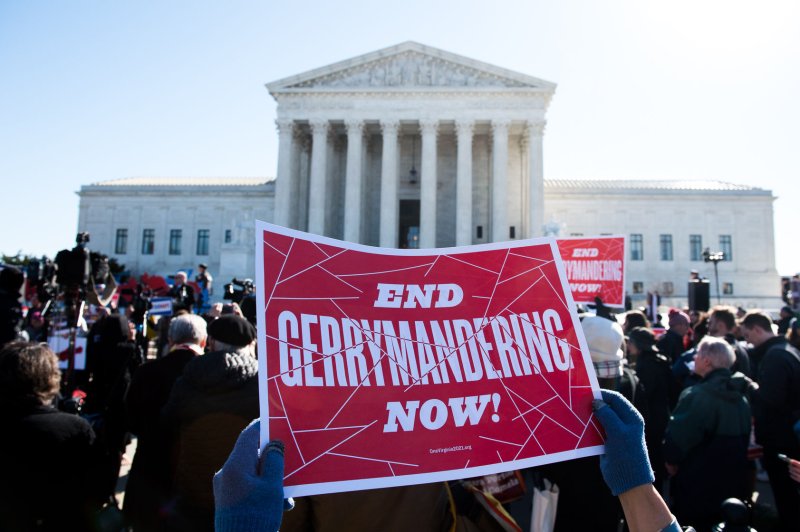A demonstrator attends a rally against gerrymandering and fair election maps outside of the Supreme Court on March 26. The high court ruled Monday that the Viriginia House of Delegates lacked standing in its gerrymandering case. Photo by Kevin Dietsch/UPI |
License Photo
June 17 (UPI) -- The U.S. Supreme Court in a 5-4 decision dismissed a Virginia House Republican challenge to the redrawing of House of Delegates maps in a gerrymandering case that appeared to be a victory for Democratic state lawmakers.
The high court ruled that House Republicans lacked standing in fighting a ruling that Democratic Attorney General Mark Herring accepted. The map in question was redrawn last year after a lower court said Republicans illegally used fixed racial targets to pack African-Americans in majority-minority districts in the original created in 2011.
The Virginia ruling produced an unusual pairing among the Supreme Court justices. Conservatives Clarence Thomas and Neil Gorsuch joined liberals Sonia Sotomayor, Elena Kagan and Ruth Bader Ginsburg, who wrote the opinion.
Liberal Stephen Breyer, joined conservatives Samuel Alito, John Roberts and Brett Kavanaugh in dissenting.
"The House also lacks standing to pursue this appeal in its own right," Ginsburg wrote. "This court has never held that a judicial decision invalidating a state law as unconstitutional inflicts a discrete, cognizable injury on each organ of government that participated in the law's passage. Virginia's constitution allocates redistricting authority to the 'general assembly,' of which the House constitutes only a part."
In writing the dissent, Alito wrote that the House Republicans would be directly affected by the ruling and could continue to challenge.
"It seems obvious that any group consisting of members who must work together to achieve the group's aims has a keen interest in the identity of its members, and it follows that the group also has a strong interest in how its members are selected," Alito said. "And what is more important to such a group than the content of its work?"
Virginia Republicans long argued that they had to use race as a factor to comply with the Voting Rights Act. They fought in the courts supporting the original map and the lawsuit by Democratic lawyer Marc Elias that sparked the court change.
"There is nothing more fundamental to our democracy than the right to vote and have a voice in our government so that it is truly representative of the people," Virginia House Democratic Leader Eileen Filler-Corn and Democratic Caucus chair Charniele Herring said in a statement.
"The 'packing' of African-American voters in the 2011 maps has diluted that fundamental right for so many Virginians of color. ... Finally, Virginians in the affected districts have the assurance that they will vote in constitutional districts in this year's election. This SCOTUS decision is a major win for voting rights and civil rights in our commonwealth," they continued.















